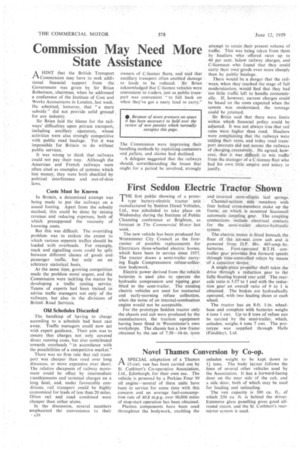Commission May Need More State Assistance
Page 52

If you've noticed an error in this article please click here to report it so we can fix it.
A HINT that the British Transport rACommission may have to seek additional financial support from the Government was given by Sir Brian Robertson, chairman, when he addressed a conference of the Institute of Cost and Works Accountants in London, last week. He admitted, however, that "a mere subsidy" did not provide solid ground for any industry.
Sir Brian laid the blame for the railways' difficulties upon private transport, including ancillary operators, whose activities were also strongly competitive with public road haulage. Yet it was impossible for Britain to do without public services.
It was wrong to think that railways could not pay their way. Although the American and French railways were often cited as examples of systems which lost money, they were both shackled by political interference and out-of-date laws.
Costs Must be Known In Britain, a determined attempt was being made to put the railways on a sound footing. Apart from the subsidy method, this could be done by raising revenue and reducing expenses, both of which presupposed the necessity of knowing costs.
But this was difficult. The overriding problem was to reckon the extent to which various separate traffics should be loaded with overheads. For example, track and signalling costs could be split between different classes of goods and. passenger traffic, but only on an arbitrary statistical basis.
At the same time, growing competition made the problem more urgent, and the Commission were tackling the matter by developing a traffic costing service. Teams of experts had been trained to advise traffic managers not only of the railways, but also in the divisions of British Road Services.
Old Schedules Discarded The handicap of having to charge according to a schedule had been cast away. Traffic managers could now act with expert guidance. Their aim was to ensure that charges not only covered direct running costs, but also contributed towards overheads "in accordance with the possibilities of a competitive market."
There was no firm rule that rail transport was cheaper than road over long distances, or more expensive over short. The relative cheapness of railway movement could be offset by intermediate transhipments and terminal charges on a long haul, and, under favourable conditions, rail transport could be highly economical for leads of less than 20 miles. Often rail and road combined were cheaper than either alone.
In the discussion, several members emphasized the convenience to their • a34 owners of C-licence fleets, and said that ancillary transport often enabled damage to loads to be reduced. Sir Brian acknowledged that C-licence vehicles were convenient to traders, just as public transport was convenient "to fall back on when they've got a nasty load to carry."
The Commission were improving their handling methods by exploiting containers and pallets, and claims had declined.
A delegate suggested that the railways should, notwithstanding the losses that might for a period be involved, strongly attempt to retain their present volume of traffic. This was being taken from them by hauliers who offered rates up to 40 per cent. below railway charges, and C-licensees who found that they could carry their own goods even more cheaply than by public haulage.
There would be a danger that the railways, when they reached the stage of full modernization, would find that they had too little traffic left to handle economically. If, however, current charges could be based on the costs expected when the system was modernized, the tonnage could be retained. Sir Brian said that there were limits within which financial policy, could be adjusted, It was not always true that rail rates were higher than road. Hauliers were complaining that the railways were 'cutting their rates, and today road transport interests did not accuse the railways of charging excessively. He agreed, however, that it was difficult to win traffic from the manager of a C-licence fleet who had his own little empire and salary to justify.




















































































